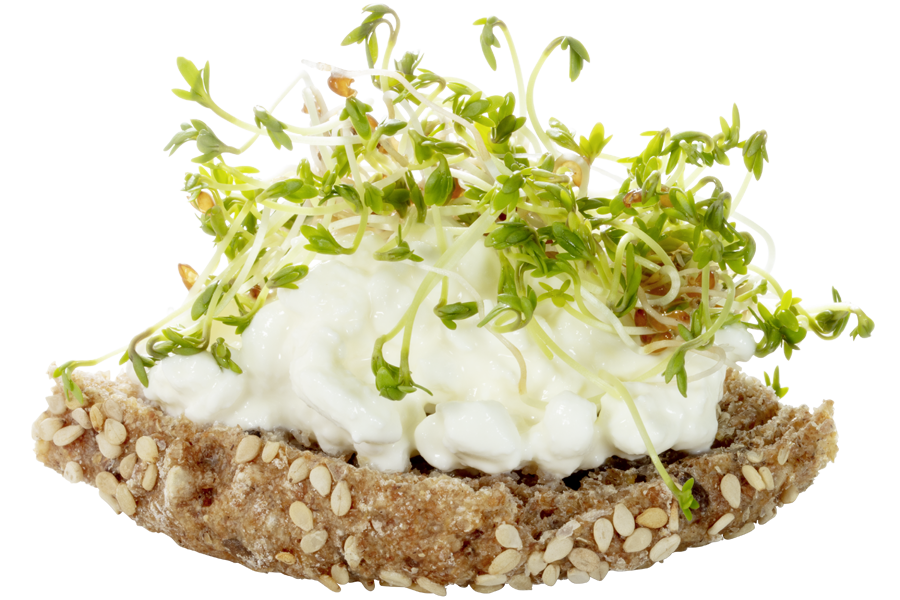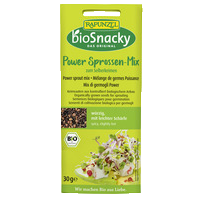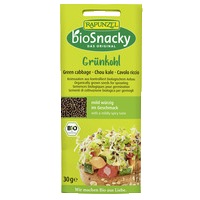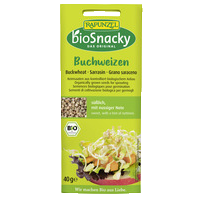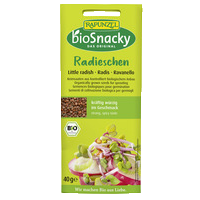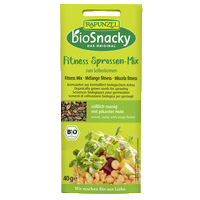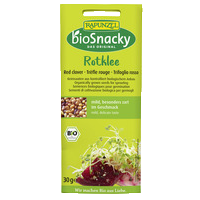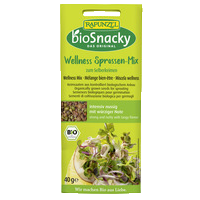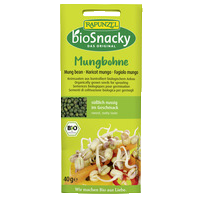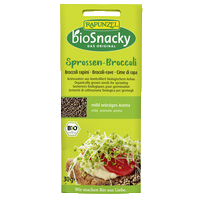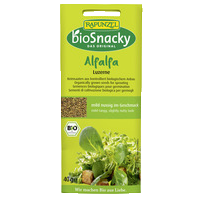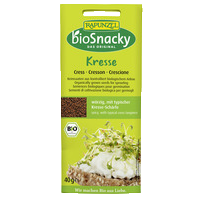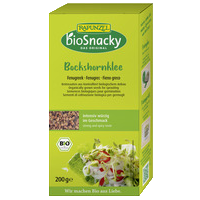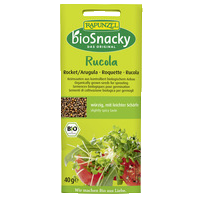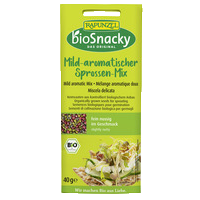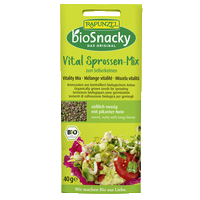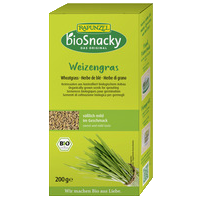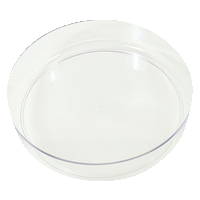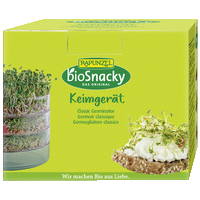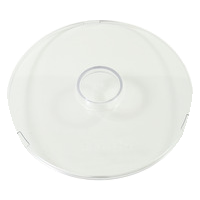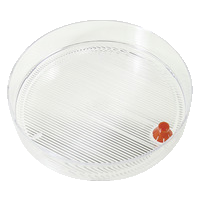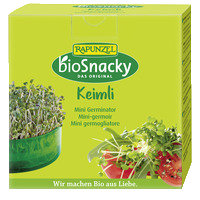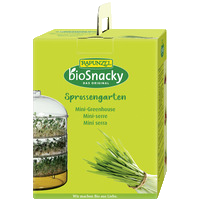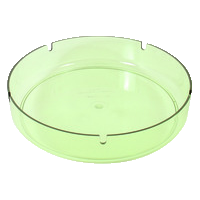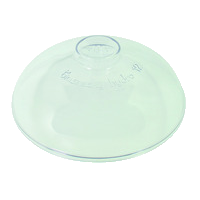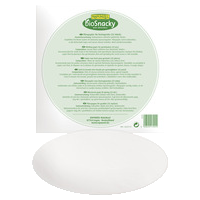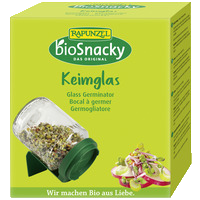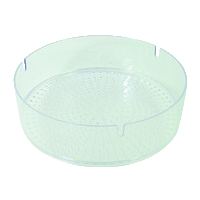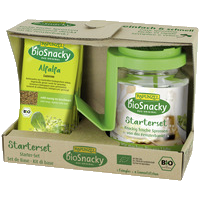Know-how: How to grow sprouts with bioSnacky
Product Knowledge: bioSnacky germinators
Product Knowledge: bioSnacky sprouting seeds
bioSnacky equipment
Growing own sprouts
The germination of seeds is a natural process that is dependent on humidity, light and air supply. The motto is: not too much and not too little of either aspect.
You should start your homegrowing with bioSnacky seed varieties that germinate without any problems - good beginners' sprouts are mung beans, alfalfa, cress or radish seeds. It's easiest if you use a Rapunzel bioSnacky germination jar.
You should start your homegrowing with bioSnacky seed varieties that germinate without any problems - good beginners' sprouts are mung beans, alfalfa, cress or radish seeds. It's easiest if you use a Rapunzel bioSnacky germination jar.

Growing your own sprouts - that's how it works:
Do you still remember from childhood days the egg cartons filled with cotton wool and cress seeds? First root hairs appeared already after a few days - the green cress herbs. Maybe you grew the cress also on paper towels... gowing your own sprouts today with bioSnacky sprouting seeds & sprouting equipment is just as simple as that.
Basic steps:
1. Avoid touching the seeds with your hands (in order to prevent contamination).
2. Thoroughly rinse seeds in a fine kitchen sieve.
3. Depending on seed variety, soak seeds for 4 to 12 hours or distribute seeds directly in the germination equipment.
4. Depending on seed variety, water seeds once or twice a day - follow package instructions.
5. Germinate seeds in a sunny, bright place near the window. Avoid direct sunlight.
6. Harvest the sprouts between day 2 and day 10, depending on seed variety. Rinse harvested sprouts prior to eating. Sprouts may be kept in the refrigerator for a maximum of 2 to 3 days.
7. Please clean germinator thoroughly before next use.
Rule of thumb: sprouts should be consumed when the seedling has grown to about 2 to 3 times the length of the seed.
Tip: start growing your own sprouts with seed varieties that germinate easily such as mung beans, cress, alfalfa or radishes.

From seed to sprout
Radish seeds can be harvested as sprouts after 4 to 5 days.
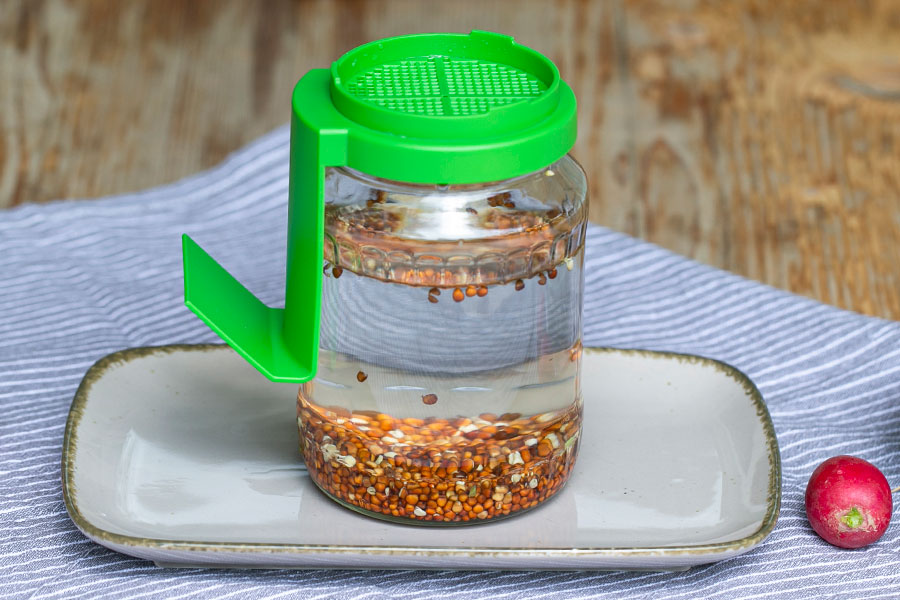
1st day
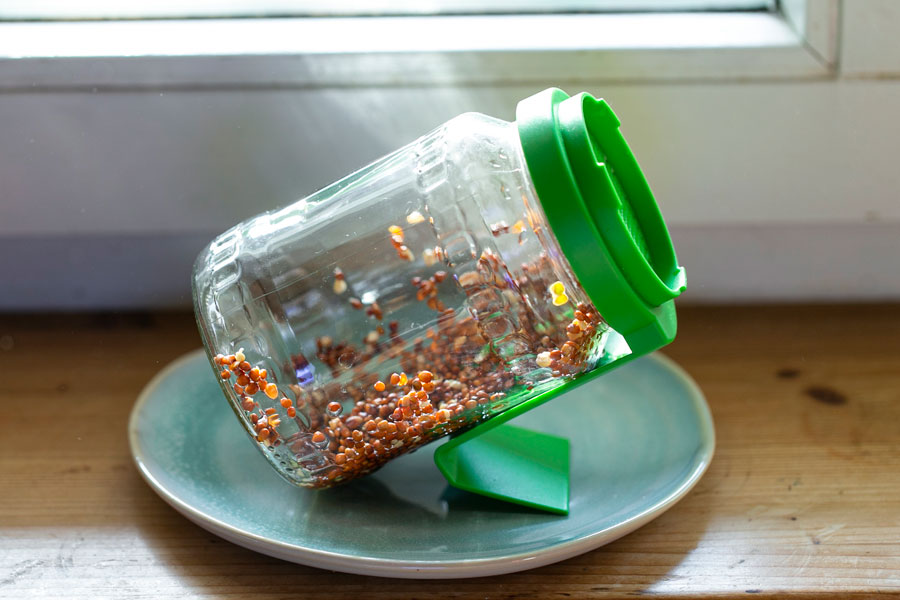
2nd day
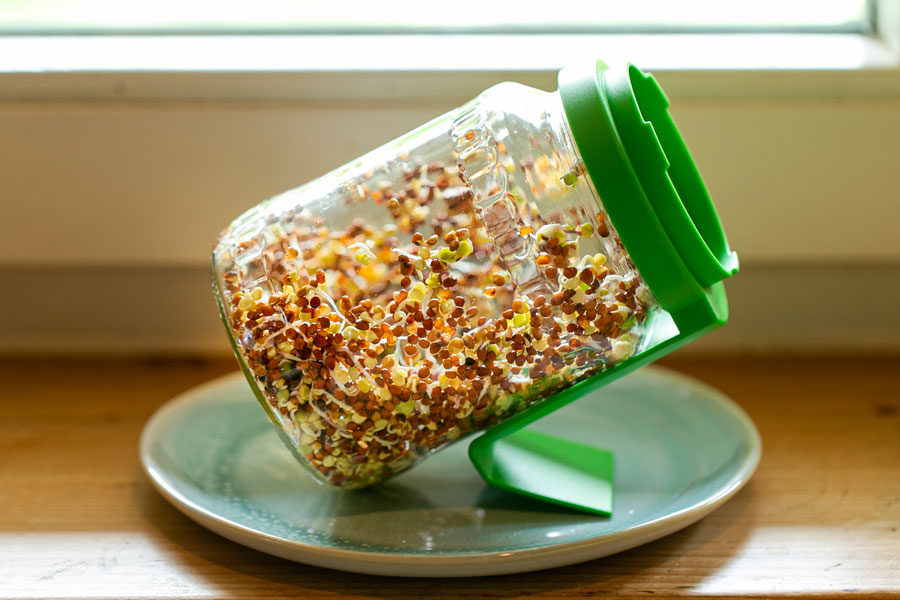
3rd day
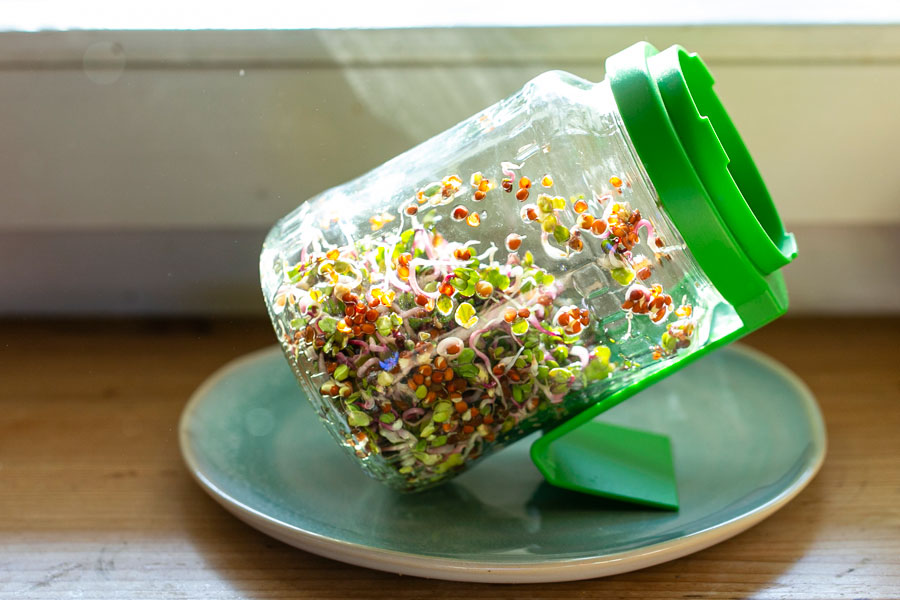
4th day

5th day

6th day
Seed, seedling, sprout, green herb, fibrous root – what's what?
Seed = the embryo within the seed
The seed is the blueprint of the plant that is contained within the seed. The germ or plant embryo is well hidden within the seed. It contains as precursers the preliminary seed leaves, the preliminary roots and the preliminary stem. None of these plant parts are yet differentiated.
Seedling = the complete baby plant
The seedling is the baby plant that has hatched from the seed. It comprises the entire plant that will develop into the adult plant including juvenile roots and the later above ground parts.
Sprout = young leaves and stems
In the proper meaning of the word, the sprouts describe only the above ground parts of the seedling, namely the stem and the leaves. Technically speaking, the roots are not part of the sprouts. For the sprouting process, however, one normally uses the term 'sprout' to describe the entire seedling. In most cases, the harvested sprouts are still so immature that they still lack functioning roots.
Green herb = green juvenile plants
When the developing plant has reached the 'green herb' stage, the stems grow orderly upwards and green leaves will have formed in the upper part of the plant. The roots are either tapping into a substrate or they are intertangled and are no longer edible. The most popular green herb plant is cress. Store-bought cress is the fully developed green herb.
Fibrous roots
Fibrous roots are small roots. They develop after 2-3 days and will continue to evolve into genuine roots. Their furry appearance resembles cotton wool and is often mistaken for mould. All seeds may develop fibrous roots during their growth phase, especially mustard, radish and alfalfa seeds.


FAQ - Frequently asked questions
This could have the following reasons:
- there are too many seeds - their density is too high
- the seeds have not been rinsed thoroughly or they have been rinsed too much – please observe package instructions.
- the ambient germination temperature is either too low or too high – the ideal temperature ranges from 18-22°C
- Unspecific seeds without high-germination quality were used. Use high-germination Rapunzel bioSnacky seeds instead
Which other circumstances may prevent germination?
Some unfavorable conditions (such as waterlogging, too much or too little water, wrong temperatur and adverse lighting conditions etc.) may result in mould formation. Mould has a musty smell and should not be confused with the fine, fibrous root hairs (tangling of roots) that some seed varieties form.
Some unfavorable conditions (such as waterlogging, too much or too little water, wrong temperatur and adverse lighting conditions etc.) may result in mould formation. Mould has a musty smell and should not be confused with the fine, fibrous root hairs (tangling of roots) that some seed varieties form.
Please oberve the following basic tips:
- Avoid touching the seeds with your hands (in order to prevent contamination).
- Thoroughly rinse seeds in a fine kitchen sieve.
- Depending on seed variety, soak seeds for 4 to 12 hours or distribute seeds directly in the germination equipment - please follow package instructions.
- Depending on seed variety, irrigate seeds once or twice a day - follow package instructions.
- A sunny, bright place near the window is ideal for germination. Avoid direct sunlight.
- Harvest the sprouts between day 2 and day 10. Rinse harvested sprouts prior to eating. Sprouts may be kept in the refrigerator for several days.
Rule of thumb: sprouts should be consumed when the seedling has grown to about 2 to 3 times the length of the seed.
Tip: start growing your own sprouts with seed varieties that germinate easily such as mung beans, cress, alfalfa or radishes.
Tip: start growing your own sprouts with seed varieties that germinate easily such as mung beans, cress, alfalfa or radishes.
If sprouts grow too crowded and lack space or if they do not get enough air, if humidity and temperature in the germination jar is too high or if you use seeds with low germination capacity, mould may form. Germination equipment that is not perfectly clean may also result in the formation of mould.
Mould is white, fluffy and has black dots. It resembles cotton wool and has a musty smell. If your sprouts are contaminated with mould you should discard them.
Mould is white, fluffy and has black dots. It resembles cotton wool and has a musty smell. If your sprouts are contaminated with mould you should discard them.
How to prevent mould:
- Keep all equipment that you use for sprouting painstakingly clean.
- Too much water is just as bad as too little water.
- Observe the basic rules and start all over. It will surely work the next time!
During the germination phase, certain sprouting seeds such as arugula and cress form so-called 'mucus mantles' around their seed - these seeds are called mucigenous seeds. As soon as mucigenous seeds come in contact with water, they start to form gel-like mucus. Therefore, these seeds cannot be germinated in a jar or in a germination tray, because the mucus would clog the drain and the seeds would be subjected to too much humidity.
A Rapunzel bioSnacky germ fleece in the germination dish prevents the formation of seed clumps as the seeds' roots can adhere to the fleece.
Another possibility would be to mix mucigenous seeds with non-mucigenous seeds such as alfalfa or red clover. In such a mixture, the non-mucigenous seeds dilute the mucus formation. This is also the case with bioSnacky seed mixtures.
Another possibility would be to mix mucigenous seeds with non-mucigenous seeds such as alfalfa or red clover. In such a mixture, the non-mucigenous seeds dilute the mucus formation. This is also the case with bioSnacky seed mixtures.
Germination of mucigenous seeds:
Rinse cress and arugula seeds only briefly and spray them with water once a day - make sure that seeds are well ventilated. Remove germination dishes and jar lids for several minutes every day in order to ensure a sufficient fresh air supply. The room temperature should not exceed 22°. Use only seeds with high germination capacity and carefully remove non-germinating or damaged seeds with a spoon.
Rinse cress and arugula seeds only briefly and spray them with water once a day - make sure that seeds are well ventilated. Remove germination dishes and jar lids for several minutes every day in order to ensure a sufficient fresh air supply. The room temperature should not exceed 22°. Use only seeds with high germination capacity and carefully remove non-germinating or damaged seeds with a spoon.
If you want to grow wheatgrass use either a growing tray with drip cup or a soil-filled pot with drainer. Use the germination jar only for soaking (12h). Harvest the wheatgrass after 7 - 10 days.
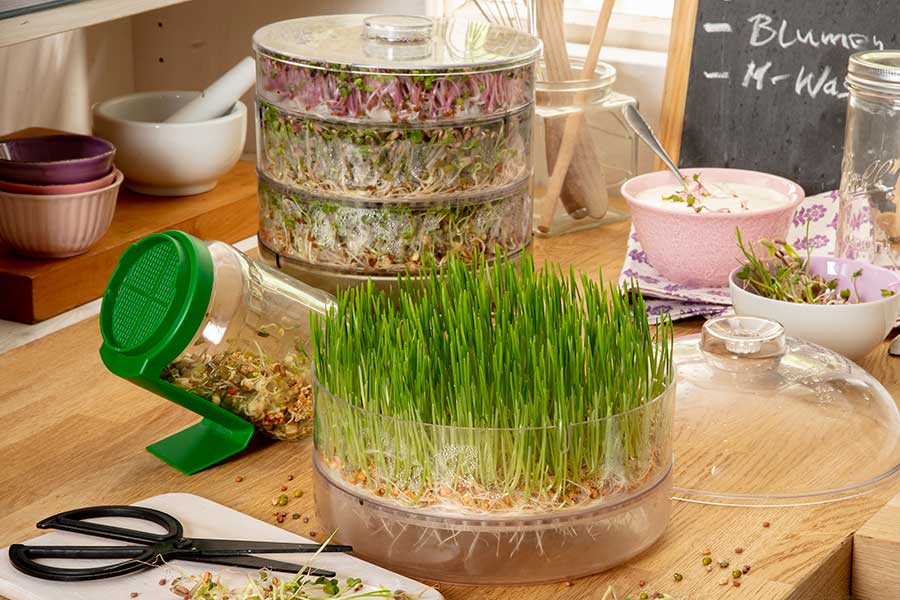
Generally speaking, all seeds, kernels and grains of edible plants can be sprouted. Not suitable are the seeds from the nightshade family (peppers, tomatoes, potatoes). Their sprouts are inedible due to the high solanine content they develop during the germination phase.
Do not use seeds that are intended for sowing in the garden, because these seeds are often pretreated against pests. Seeds, kernels and grains that are suitable for direct consumption have no guaranteed germination capacity.
Do not use seeds that are intended for sowing in the garden, because these seeds are often pretreated against pests. Seeds, kernels and grains that are suitable for direct consumption have no guaranteed germination capacity.
Best suited are seeds that were produced for sprouting and that come from controlled organic cultivation.
Rapunzel bioSnacky seeds are untreated seeds with high germination capacity. They are natural products from controlled organic cultivation and they comply with strict quality criteria. These seeds can be purchased in organic stores, natural health food stores and organic supermarkets.
Rapunzel bioSnacky seeds are untreated seeds with high germination capacity. They are natural products from controlled organic cultivation and they comply with strict quality criteria. These seeds can be purchased in organic stores, natural health food stores and organic supermarkets.
There are many different kinds of sprouting seeds, from alfalfa or cress all the way to wheatgrass. For beginners we recommend sprouting seeds with high germination capacity. You should choose sprouting seeds according to your personal taste but also according to the germination equipment that you want to use.
In a germination jar, for example, only one seed variety can be sprouted at a time.
On the other hand, a germination jar is not suited for the sprouting of cress or arugula because these are mucigenous seeds.
In a germination jar, for example, only one seed variety can be sprouted at a time.
On the other hand, a germination jar is not suited for the sprouting of cress or arugula because these are mucigenous seeds.
When you use a growing tray, you can start simultaneously with three different sprouting seeds. The vaulted lid of a growing tray is ideal for the cultivation of wheatgrass.
For your first sprouting trials, we recommend cress and mung beans. Both of these sprouting seeds have the great advantage that they can be harvested already after 3 to 5 days. At the same time, cress does not need to be soaked. Beginners need less patience for the sprouting of cress than for example for the cultivation of alfalfa sprouts.
For your first sprouting trials, we recommend cress and mung beans. Both of these sprouting seeds have the great advantage that they can be harvested already after 3 to 5 days. At the same time, cress does not need to be soaked. Beginners need less patience for the sprouting of cress than for example for the cultivation of alfalfa sprouts.
